[Photo Credits: Roxanna Gonzales]
Lauren Wenderoth is the founder of The Village Refillery, a zero-waste, bulk refill shop in Corrales, New Mexico. After the pandemic and losing her father, she left her dietetics career in San Francisco to focus on sustainability and spending time with her children. Lauren’s shop allows customers to bring their own containers to fill with non-toxic household products, aiming to reduce plastic waste. Her story is one of resilience and commitment to a healthier planet and community. In this Faces of Entrepreneurship profile, Lauren shares her journey, values, and vision for a sustainable future.
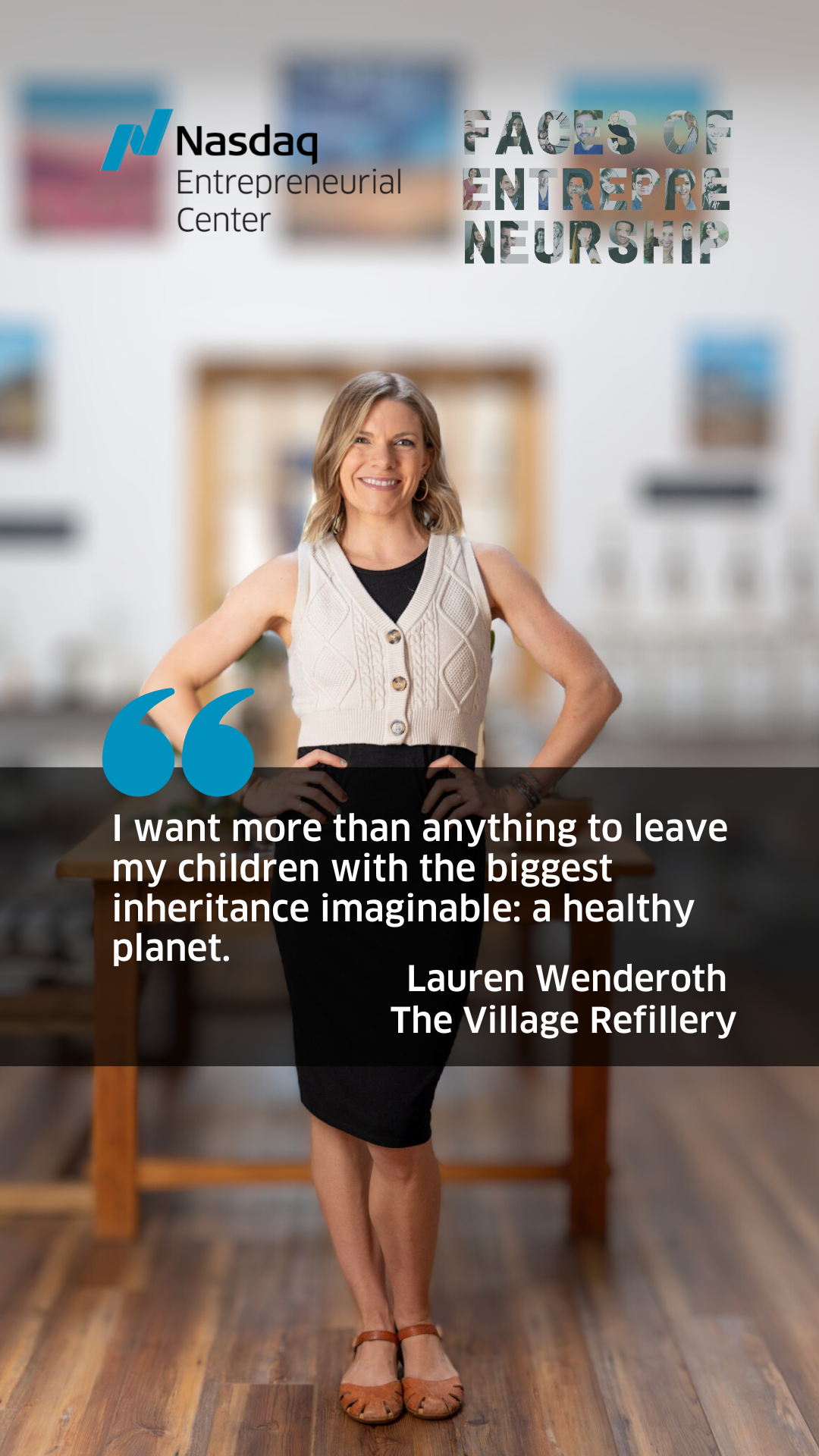 What is your company’s origin story? What is the biggest reason you started your business? What did those early days look like and teach you?
What is your company’s origin story? What is the biggest reason you started your business? What did those early days look like and teach you?
Lauren Wenderoth: I want more than anything to leave my children with the biggest inheritance imaginable: a healthy planet. I also want to look back upon my life and be able to say that I was present for my children and that I modeled a healthy work/life balance. After working in the field of mental health for over a decade, I was burnt out and emotionally depleted. I am historically not a risk taker, but I knew something needed to change for the sake of our family’s wellbeing.
My husband, who is a partial owner of a residential solar company in New Mexico, inspired me to consider a career change that would help align my passion for nature and sustainability with my love for creating. So, in 2023 I started The Village Refillery, a zero-waste refill shop, as both a creative outlet and a way to channel my climate anxiety into actionable change. I don’t have a degree in business or marketing, but I believe in my mission to empower my community to embrace sustainable living by providing an alluring and accessible low-waste home shopping experience. So, whether my business “makes it” or its days are numbered, I will have taken a risk worth taking. And when I tell my daughters they can do anything they set their minds to, they will believe me because they will have witnessed me believe in myself.
What are your personal driving principles, your top values?
LW: From a young age, my parents instilled in me the value of allyship toward others, particularly those with less privilege. My mother spent her career in special education and had a zero-tolerance policy for discrimination toward marginalized students. These values shaped my work as a dietitian, where I worked predominantly with folks facing body and gender discrimination, as well as with people with neuro-differences. These values have undoubtedly shaped my business ethics thus far and will continue to do so.
My parents were also hippies and practiced many original forms of zero-waste, like using cloth diapers and shopping second-hand. Their frugality was annoying to me as a teen, but now, as I see what plastic pollution and overconsumption has done to the Global South, I appreciate the lessons they taught me in leaving a lesser footprint behind.
How have your personal principles and values shaped your company’s values and principles? Give us some examples.
LW: Every decision I make as a “green” business owner is rooted in doing no harm to our environment and promoting a shift in consumer habits that fosters a circular economy. Early in the business, we decided not to ship our goods to stay true to our values of reducing carbon emissions and encouraging people to shop from local businesses rather than distant online marketplaces. We deliver via electric vehicle only to a small, local radius within our county even though it means limiting our clientele geographically. These are examples of how we put people and the planet above profit.
Additionally, we are steadfast in our commitment to supporting communities who have been most harmed by wasteful capitalism and economic colonialism. Recognizing that certain groups are disproportionately affected by climate change, we actively stock inventory from makers and small businesses who are either owned and operated by marginalized individuals, or who donate a portion of revenue to them, namely women, who own 16 of the 18 brands we carry; Indigenous peoples of the North American Southwest; Black Americans; LGBTQIA+; and/or individuals with disabilities).
Building and sustaining a business often involves overcoming various challenges. Can you share a specific moment where your entrepreneurial resilience was tested, and how did you navigate through it to ensure the sustainability of your business? What lessons did you learn from that experience?
LW: Early on in my entrepreneurial journey, I had the opportunity to participate in the Empower by GoDaddy program, GoDaddy’s signature social impact program that provides education, mentoring and networking to help underserved small business owners grow their businesses. However, because I was still working at my former job, I couldn’t take full advantage of the program. I couldn’t afford to hire a web designer, so I committed myself to learning and spent one-on-one time with GoDaddy employee volunteers to create and publish a website I am quite proud of. Fortunately, the GoDaddy web builder platform was so user-friendly, the process was fun and manageable. Being able to create the entire website myself in lieu of hiring someone saved me start-up money that then went elsewhere, helping the business be more viable from the start. I am grateful that my participation in GoDaddy’s program led me to receive recognition of my business on a larger platform within GoDaddy’s 2023 Sustainability Report.
Can you share some insights into the market or industry you operate in? How have you navigated challenges and changes in the market landscape?
LW: From the start, I believed that most people, when given the choice, will elect eco-friendly and sustainable products over the alternative. The plastic problem isn’t a result of corrupt customer morals, but of what’s accessible to us. It’s impossible to shop at chain grocery stores or big box home goods stores and not buy plastic. At the same time, for the refill model to work, refilleries have to provide what shoppers have grown to expect: convenience. I knew that refill shops were gaining in popularity across the US in urban, suburban and rural areas, proving this is a model people across varying demographics support. But as a busy mom myself, I also knew that unless refilling was a convenient way to shop, it wouldn’t be sustainable for folks. And indeed, it seems that for every new refill store I see open, another one is forced to close its doors. This is our industry’s biggest challenge – returning to a pre-plastic era while advancing with innovative technologies that consumers already enjoy or want to adopt.
One example of how we’re making the refill model more user-friendly and attractive is by utilizing an amazing app called Filljoy, an RFID (Radio Frequency Identification) smart tag system that talks to our POS software and makes customer checkout a breeze. Thanks to the creator, Derrick Chao, there’s no more writing down, calculating or manually entering scale readings. The app has enabled refilling to be as quick and convenient as the mainstream methods people are used to, but with a “high-tech” twist.
What role does mentorship play in your world (as a mentor or mentee)? Tell us about what makes mentorship valuable to you and your business.
LW: Perhaps because my mother was a teacher, I have a lifelong love for learning. And my parents, who didn’t have much money, ensured what they did have went toward my education. Because of that, I’ve had many career opportunities in adulthood. I knew early on that once I was able to hire employees, I wanted to help support job seekers who didn’t have the same privileges I had growing up. Just this past week I was able to hire my third employee through the New Mexico Workforce Connection’s WIOA (Workforce Innovation and Opportunity Act) Youth Program. This program matches New Mexico employers with young job seekers in the state who are low-income, disabled or English language learners. We were matched with a 24-year-old who aspires to be an entrepreneur herself and is eager to be part of a start-up team. She’s learning from us, and we’re learning from her. It’s a win-win!
Many entrepreneurs continue to perfect their daily routines to support their work and greater vision; would you mind sharing your morning routine or a regular ritual that grounds your work each day?
LW: I love routine, but I learned early on as a small business owner – and for the first six months, a one-woman show – that most days, routine goes out the window and you often have to go with the flow. I typically have a long to-do list that I plan to tackle, but my day pans out differently. I get pulled in many directions and I’ve learned to let go of the to-do list and pause to ask myself, “What absolutely has to be done by end of day?” Everything else can wait.
Given that I can’t have a set routine at this point, I do my best to devote some time to myself before work starts. After dropping the kids off at school, I usually head to yoga at a wonderful locally-owned studio that just happens to be next door to my shop and offers morning classes. I get to spend time with fellow community members while also grounding myself for the day ahead before opening my doors.
Do you have a favorite quote, mantra, or words of wisdom to get through the tough days?
LW: I am incredibly grateful to The Women’s Economic Self-Sufficiency Team (WESST) of New Mexico. They partner with Empower by GoDaddy and provide free training and consulting to women in New Mexico who want to start a business, and they’ve provided me with much-needed guidance from the start. In our first meeting, my business advisor, Dave Vedera, asked me to tell him about my business concept. I started telling him about all the amazing products I would make and sell. He stopped me and told me to go home and watch Simon Sinek’s TED Talk. Introducing me to this was a game-changer. Two of Sinek’s quotes have become my grounding business mantras:
- “People don’t buy what you do; they buy why you do it.”
- “The goal is not to do business with everybody who needs what you have. The goal is to do business with people who believe what you believe.”
Anytime I feel lost in my direction, these two quotes help me re-establish my North Star.
What kind of an entrepreneur do you want to be known as – as in, what do you want your legacy to be?
LW: I know that one zero waste store won’t solve our climate crisis, but I want my daughters to know I chose to be part of the solution rather than the problem. When I’m gone, I hope they will reflect on my life and understand that I chose their future and the health of our planet over everything else.
Do you have someone you’d like to nominate to be profiled in our Faces of Entrepreneurship series? Please let us know by emailing media@thecenter.nasdaq.org or submitting your nomination using this form.
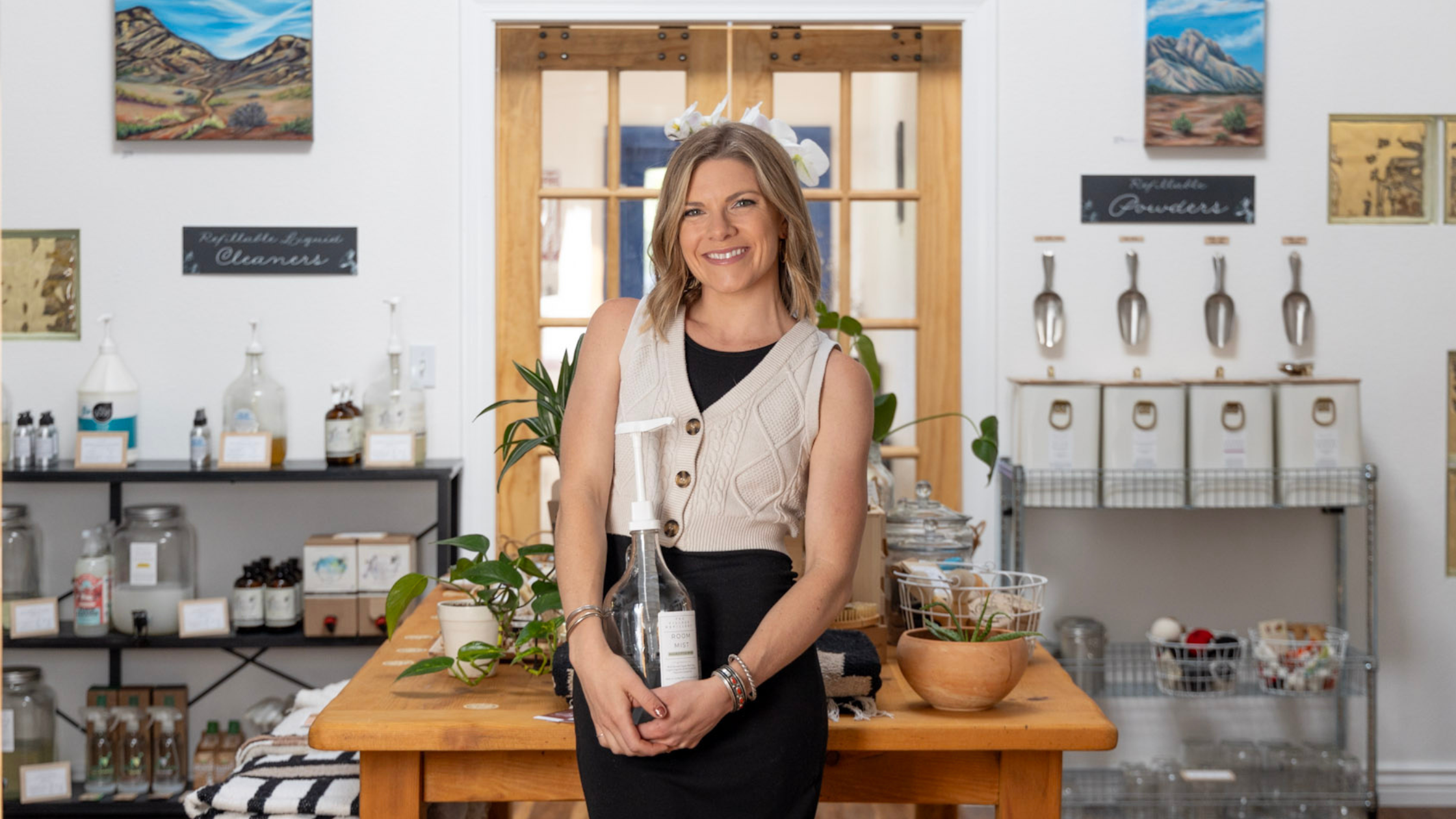
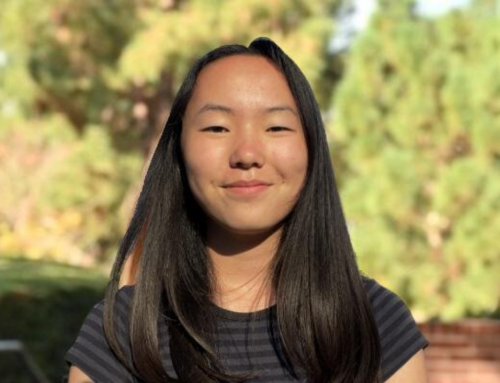
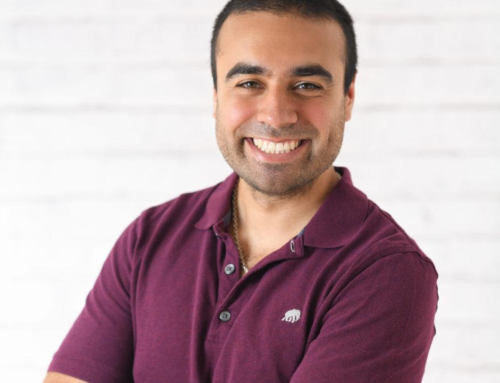
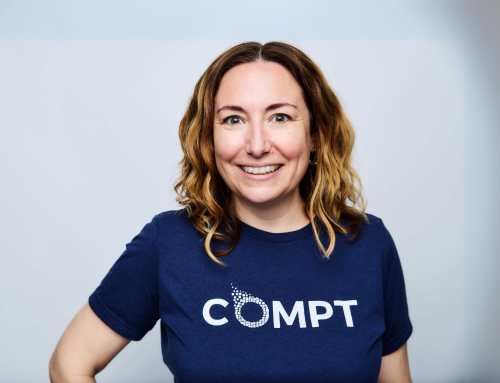
Invite a Friend
Close